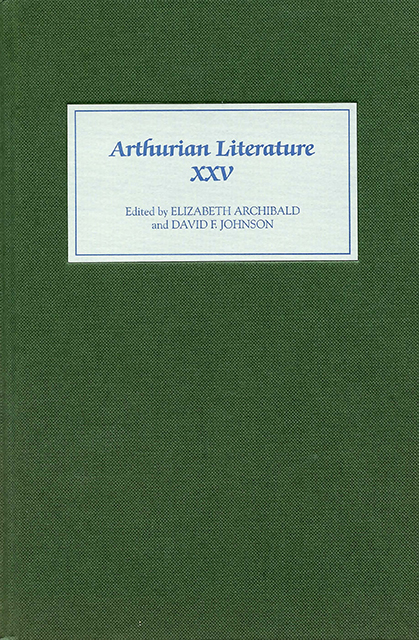Book contents
- Frontmatter
- Contents
- Illustrations
- Foreword
- Contributors
- Abbreviations
- I Geoffrey of Monmouth and the Merlin Legend
- II The Enchantress, The Knight and the Cleric: Authorial Surrogates in Arthurian Romance
- III ‘Morgan Le Fay, Empress of the Wilderness’: A Newly Recovered Arthurian Text in London, Bl Royal 12.C.IX
- IV Malory's Lancelot and the Key to Salvation
- V Chrétien in Ivory
- VI ‘An Empire of Itself’: Arthur as Icon of an English Empire, 1509–1547
VI - ‘An Empire of Itself’: Arthur as Icon of an English Empire, 1509–1547
Published online by Cambridge University Press: 10 March 2023
- Frontmatter
- Contents
- Illustrations
- Foreword
- Contributors
- Abbreviations
- I Geoffrey of Monmouth and the Merlin Legend
- II The Enchantress, The Knight and the Cleric: Authorial Surrogates in Arthurian Romance
- III ‘Morgan Le Fay, Empress of the Wilderness’: A Newly Recovered Arthurian Text in London, Bl Royal 12.C.IX
- IV Malory's Lancelot and the Key to Salvation
- V Chrétien in Ivory
- VI ‘An Empire of Itself’: Arthur as Icon of an English Empire, 1509–1547
Summary
In Monty Python and the Holy Grail (1975), King Arthur rides up to a peasant and declares himself ‘Arthur, king of the Britons’. When the peasant puzzlingly asks, ‘Who are the Britons?’, Arthur rather uncertainly replies that ‘We are all Britons.’ The year 1975 also saw the publication of J. G. A. Pocock's groundbreaking article ‘British History: A Plea for a New Subject’. Pocock sought to bridge the divide between anglocentric approaches to English history on the one hand, and isolationist approaches to Scottish, Welsh and Irish histories on the other. His article encouraged non-isolationist perspectives on British history, which recognise England's past cultural and political ascendancy within the British Isles, but which do so from both English and non-anglocentric points of view. Pocock inaugurated what has since been called the ‘new British history’, or ‘British Problem’, a historiography that could take as its motto the Monty Python King Arthur's claim that ‘We are all Britons’ – or at least live in an archipelago shaped irrevocably by over five hundred years of British state-formation. Over the past three decades, historians of England – and, more recently, of English literature – have set English within the wider context of British history and literature. One effect of this ‘new British history’ has been to highlight the influence on early modern English literature of England's colonial interests in Wales, Scotland and Ireland, with recent years seeing a spate of critical studies that establish ‘British’ contexts for writing by Spenser and Shakespeare in particular.
Yet in the rush to approach Tudor England from a ‘British’ perspective, recent criticism has risked losing sight of England's self-image in the earlier sixteenth century as a sovereign realm, independent of Rome and the rest of Britain alike. Take Willy Maley, for example, who writes that England in the sixteenth century was a nation ‘nasty, British, and short’, its identity as England confined to the seventy-year period between the promulgation of the Appeals Act in 1533 and the accession of James I in 1603. The Appeals Act announced England's independence from foreign powers, notably the Church of Rome; the accession of James I saw yet another foreign power – James VI of Scotland – take up rule in England. Maley's England is the meat in the sandwich, the fragile nation-state caught between a rock and a hard place, between the shadow of Rome and the spectre of Britain.
- Type
- Chapter
- Information
- Arthurian Literature XXV , pp. 153 - 174Publisher: Boydell & BrewerPrint publication year: 2008

